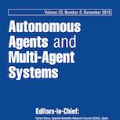Software systems are increasingly used in application domains characterised by uncertain environments, evolving requirements and unexpected failures; sudden system malfunctioning raises serious issues of security, safety, loss of comfort or revenue. During operation, these systems will likely need to deal with several unpredictable situations including variations in system performance, sudden changes in system workload and component failures. These situations can cause deviation from the desired system behaviour and require dynamic adaptation of the system behaviour, parameters or architecture. Through using closed-loop control, typically realized with software, intelligent and autonomous software systems can dynamically adapt themselves, without any or with limited human involvement, by identifying abnormal situations, analysing alternative adaptation options, and finally, self-adapting to a suitable new configuration. This report summarises the research carried out during SEfIAS GI Dagstuhl seminar which provided a forum for strengthening interaction and collaboration for early-career researchers and practitioners from the research communities of SEAMS, ICAC/ICCAC, SASO, Self-Aware Computing and AAMAS.
翻译:软件系统越来越多地用于应用领域,其特点是环境不确定、要求不断变化和意外故障;突然的系统故障引发了安全、安全、舒适或收入损失等严重问题。在运行期间,这些系统可能需要处理若干不可预测的情况,包括系统性能的变化、系统工作量的突然变化和部件故障。这些情况可能导致偏离理想的系统行为,需要动态地调整系统行为、参数或结构。通过使用闭路控制,通常通过软件实现的智能和自主软件系统可以在没有或有限的人参与的情况下动态地自我适应,方法是查明异常情况,分析替代性适应备选办法,最后,自我适应适当的新配置。本报告总结了在SEfIAS GI Dagstuhul研讨会期间进行的研究,这些研究为SEAMS、ICAC/ICCAC、SASO、SOSAWAWE、AMAMAS等研究界的早期护理研究人员和从业人员提供了一个加强互动与协作的论坛。





